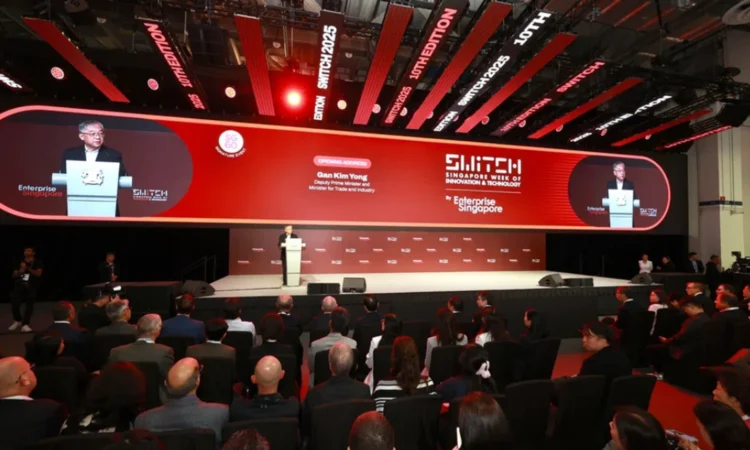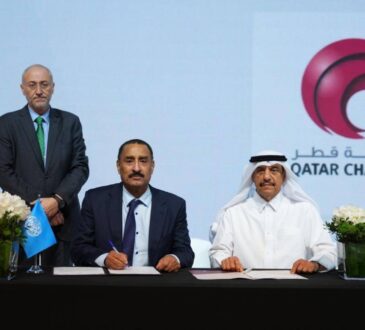
[SINGAPORE] Artificial intelligence (AI) startups in Singapore will get help to scale more quickly in the region and globally, thanks to a new tie-up between Microsoft, Enterprise Singapore and the National University of Singapore’s (NUS) entrepreneurial arm.
This is part of Singapore’s plan to forge partnerships that take ideas from Singapore to the world, said Deputy Prime Minister Gan Kim Yong.
The new partnership, which he announced on Wednesday (Oct 29), will expand the existing AI Accelerate programme run by Microsoft and NUS Enterprise’s Block71 startup hub.
The current programme features a 10-week incubator where startups can build on Microsoft Azure – the firm’s cloud computing platform – while refining their products, tapping expert guidance for business strategy and fundraising, and connecting with mentors and investors.
With the expansion, it will include a go-to-market track where experts from Microsoft will provide startups with practical guidance to help them scale more effectively in regional and global markets.
Up to 150 startups will enter the AI Accelerate programme over the next three years, and they may be considered for streamlined access to Startup SG Tech grants.
BT in your inbox

Start and end each day with the latest news stories and analyses delivered straight to your inbox.
Enterprise Singapore, through the Digital Industry Singapore office, will work with Microsoft to fast-track these grants for eligible firms.
Firms will be assessed by a panel comprising industry players and venture capital representatives, with grants going to those in areas such as intellectual property filings, the use of cloud and AI to build products, as well as talent acquisition.
“These startups will receive support in product-market fit, technical development and market access, leveraging Microsoft’s global network,” said DPM Gan at the opening ceremony of Singapore Week of Innovation and Technology (Switch).
He said that the government wants Singapore to be a place that offers stability amid uncertainty; a hub that connects Asia’s growth markets with the rest of the world; and a platform where ideas, talent and capital converge to address global challenges.
“To strengthen this position, we will continue to invest in science and technology, accelerate the translation of research into enterprise, and forge partnerships that take ideas from Singapore to the world,” he said.
He also announced that Nanyang Technological University (NTU) and US-based non-profit organisation Activate Global have launched a new fellowship to boost science entrepreneurship and develop deep tech startups in Singapore.
The partnership will feature a S$12 million commitment to support up to 20 science fellows and 20 co-fellows over the next three years.
It will be funded by the National Research Foundation and supported by Enterprise Singapore, which will provide startup founders with potential access to additional funding as well as a network of ecosystem partners including investors, corporates and infrastructure providers.
The fellowship is open to all Singapore scientists and engineers with early-stage innovations that have the potential for commercial and social impact.
It will focus on key deep tech areas such as advanced materials, robotics, AI and biotechnology.
“The programme will help researchers gain hands-on experience in building companies, such as fundraising, training and product development – they will also benefit from access to Activate’s global network,” said DPM Gan.
He also announced Enterprise Singapore has enhanced its Global Innovation Alliance strategy, where startups that have ready products and initial market traction will benefit from stronger connections to commercial and investment opportunities through an expanded network of partners.
The first corporate partner under the Global Innovation Alliance partner network is ST Engineering Ventures. The partnership will channel up to S$3 million over two years into technology testing and commercialisation through pilot projects and access to global markets.
It will support 16 global startups to pilot technology solutions in Singapore with ST Engineering’s business units, tackling real-world problems in deep tech areas including AI, robotics and advanced materials.
Up to another 10 Singapore startups will be supported to expand overseas through proof-of-concept trials leveraging ST Engineering’s global networks.
On the climate front, DPM Gan said the Breakthrough Energy Fellows South-east Asia Programme – a partnership between Breakthrough Energy, Enterprise Singapore and Temasek – is supporting startups developing technologies tailored to the region’s needs, such as cooling paint and advanced recycling.
Of the two cohorts supported so far, six startups are based in Singapore, reflecting how local innovators are helping to shape the region’s low-carbon transition, said Gan.
Singapore is also working with Wavemaker Impact, a climate-tech venture builder that has created 15 startups in three years.
“All of them have secured investments, and the next phase will focus on helping these firms achieve product-market fit faster, so their innovations can scale and deliver impact sooner,” said DPM Gan.
He also highlighted that Singapore is investing in the emerging field of embodied AI, where robots and intelligent systems can sense, learn and act in real-world environments.
Advances in embodied AI could significantly change the way industries operate, by augmenting human capability and allowing companies to overcome labour and productivity constraints, he said.
“This is strategically important for Singapore as many of its key sectors, such as logistics, advanced manufacturing and healthcare are being reshaped by AI and robotics,” he said.
The government is working with industry leaders such as port operator PSA to explore how embodied AI can transform their operations and augment their workforce, with a view “to develop Singapore into a global testbed for the safe and scalable deployment of next-generation robotics”, DPM Gan said.
Speaking on the sidelines of the event on Wednesday, Minister of State for Trade and Industry Alvin Tan said Singapore continues to punch above its weight in innovation.
He noted that in September the Global Innovation Index ranked Singapore fifth globally and second in the region – the third consecutive year that Singapore has been among the top five economies on the list.
The ranking takes into account the supportive ecosystem that enables innovation, including a business-friendly environment and intellectual property infrastructure, as well as a stable and predictable governing and operating environment, Tan added.
“This did not come by chance. It’s the result of years of investment in our innovation and enterprise ecosystem, and we do that in partnership with our small and medium enterprises and startups,” he said.
“What this means is that Singapore continues to remain a place where innovation is born and thrives.” THE STRAITS TIMES



